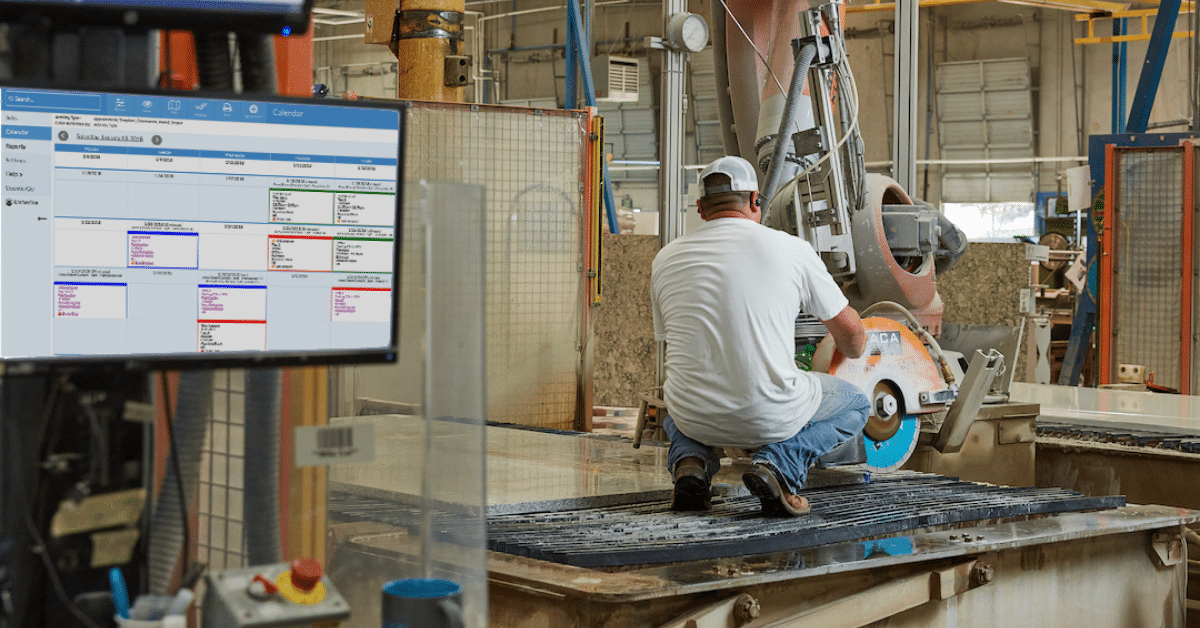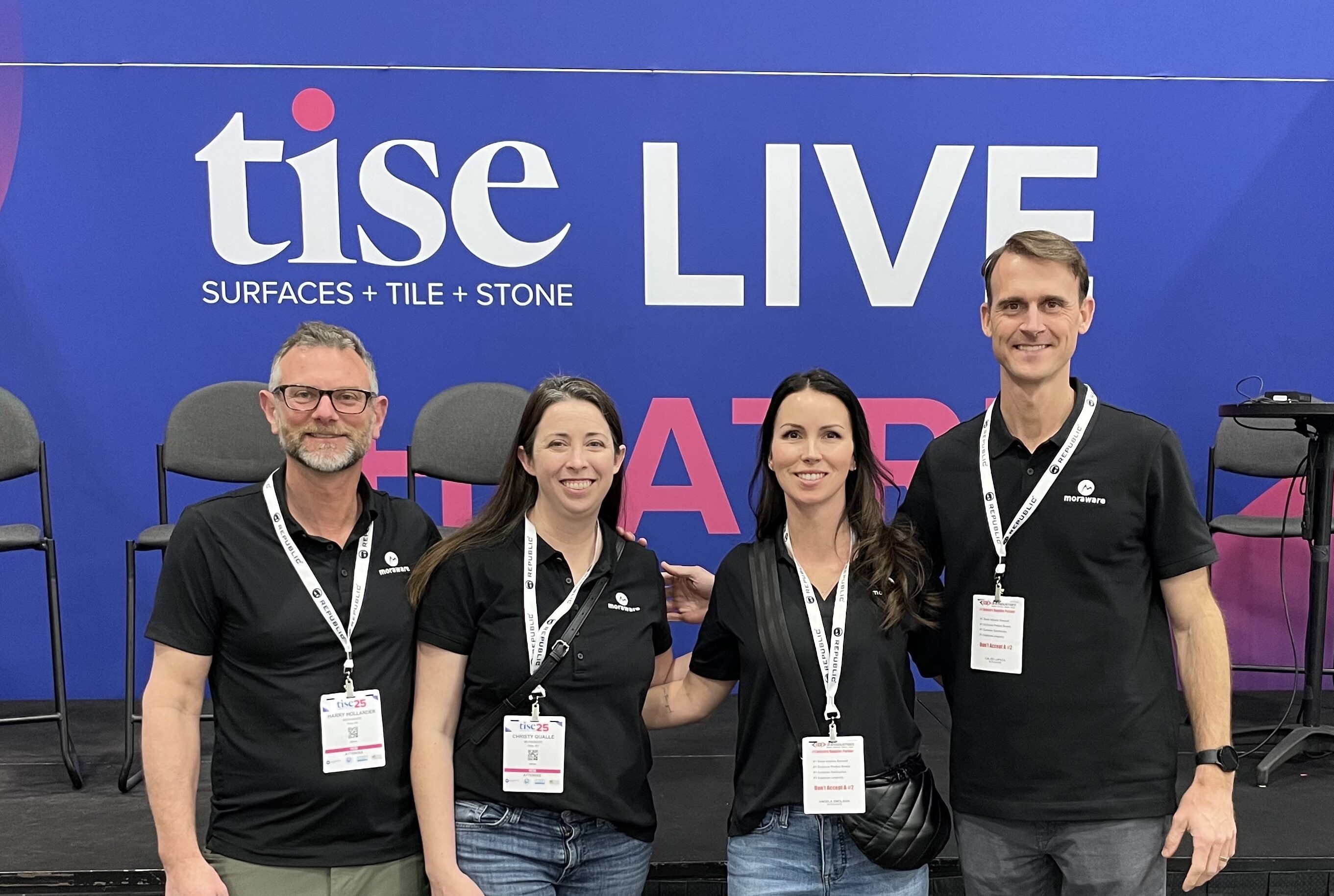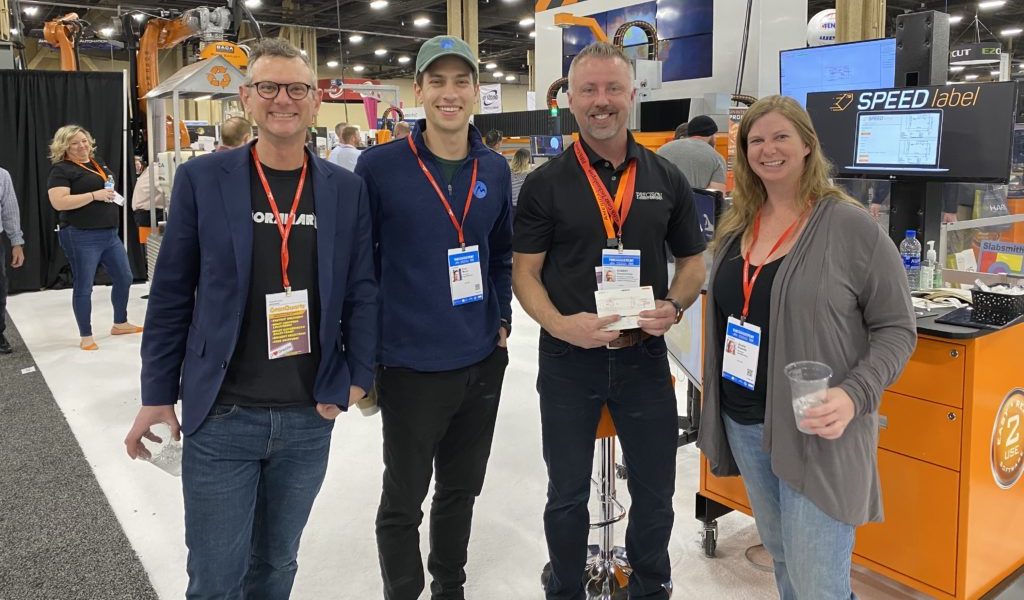For the first four or five months, Geoffrey Gran of The Countertop Factory Midwest used a whiteboard to organize scheduling for his countertop company. He realized very early on that his team needed software to become more efficient. Through the grapevine, Gran heard of others in the business using Moraware, so he scheduled a demo and signed up shortly after.
Looking back, Gran says, “It was the only reason we were able to go paperless.”
Once he went paperless in the shop, he realized the office needed to follow suit.
“I heard employees in the office asking where a certain job folder was,” he says. All of the job information was in Moraware, so there really wasn’t a need for a folder. When he asked the team why the process was basically duplicated on paper, everyone realized they were just going through the motions.
“It was the way we’d always done it,” Gran says. That day, they said goodbye to job folders.
At that point, TCF was almost totally paperless. “It was magical,” Gran says.
For the next few years, a few documents would be printed, such as the Moraware job spec sheet or maybe some plumbing specs. These papers would get wet, they’d get lost, and at the end of the day, quality control would be wasting their time trying to track down paperwork.
Gran is always finding inefficiencies and seeking out ways to make his shop run more smoothly. It wasn’t long after that he came up with a labeling process idea, and in the summer of 2016, SPEEDLabel was born.
Reworks and Remakes
Gran says many fabricators don’t track their reworks and remakes. Most shops have no idea if it happens.
“If you don’t have the paperwork in front of you, you don’t know if what you’re doing is right,” he explains.
According to Gran, the average fabricator has 10% of its business in reworks and remakes. TCF is at 1.5%, and they work hard at it.
“Reworks and remakes are the direct enemy of profitability,” Gran explains. “Every time you have a remake, you need more material and more labor. Then, you have the opportunity cost, and the customer wants compensation.”
To help his shop – and fabricators across the globe – solve this massive problem, he started coming up with a labeling process. “When we realized how amazing it was, we started selling it to other fabricators,” he says.
Moraware Integration
SPEEDLabel directly integrates with Moraware. If you’re a Moraware user, you can type in the unique Moraware job ID number, and it automatically pulls in that data.
You can use that data to add up to 10 fields to the label.
Gran explains Fifth Gear Technologies is currently working on a tracking app so you can scan the barcode of every piece in your shop to turn activities off and on and change statuses in Moraware.
For example, if you have an activity that says C&C, you can scan the piece before you go on the C&C, it’ll scan it to “In Progress,” and when that’s done, you can scan again, and it’ll say “Complete.” That way, you can track duration in Moraware or on the app.
You can also scan the pieces when they go onto the truck. Say you have seven pieces – if you only scanned six, it’ll pull up a picture of the piece you’re missing, and it’ll tell you where it was last scanned so you can retrieve it.
When you get to the customer’s home, you can scan all the pieces again. Once the customer approves it, they can sign off right on the app, and the activity changes to Completed.
“We’re really trying to change the way fabricators run their business,” he says.
Running Reports
When you track everything, you have the ability to run reports.
For example, if you have a piece on your C&C and it breaks, most shops don’t realize it happened, and the employee just grabbed another remnant. Now, if a piece breaks, you can report that issue in the app.
It’s time-stamped, you know who added that issue, and you can run reports on it.
Gran and his team at TCF call these reports green sheets. “We call it a green sheet because green is the color of money,” Gran says.
Gran and his entire team pay attention to that green sheet because every time there’s a rework or remake, it costs everyone money. “We all participate in wins as the company does better. Every department has its own incentive program, which encourages everyone to do their jobs better. If the company wins, employees win too,” he says.
The bottom line: most companies don’t track reworks and remakes, and SPEEDLabel helps you do that.
Go Paperless
Gran explains going paperless is a positive byproduct of using SPEEDLabel in the shop.
He says most fabricators using SPEEDLabel will tell you they’re on their way to being paperless, but shops without the software aren’t.
“They just don’t have a way to do it,” he says.
Getting Buy-In
Change is often met with hesitation, and new software is no exception. However, Gran says if you’re using Moraware, the SPEEDLabel integration is very elegant.
All the information is already in Moraware – edge profile, material thickness, color, etc. – so, once that information is mapped, it’s pulled automatically to the label. There’s no double entry.
“It takes about 15 seconds to capture the image for the label and then print it out,” Gran says.
SPEEDLabel is an easy addition to your existing process, which makes it much easier to get buy-in from your team.
“The label helps so many different parts of our business. It’s just a simple label – it’s amazing,” Gran says.
Interested in going paperless? Get organized with Systemize, our scheduling and job management software, and talk to our team!
Related:



